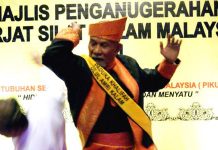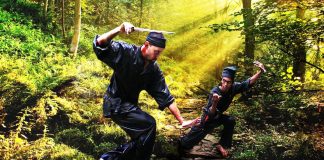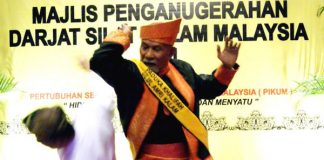In an article in TheJakartaPost, we read an article about Silat Beksi that we found interesting.
Jakarta’s society is consistently modernizing and Silat Beksit, a variation of traditional pencak silat that is deeply rooted in the Betawi culture, is fighting to stay relevant.
One of the most commonly practiced forms of silat in Greater Jakarta, Silat Beksi, is different from other Betawi silat styles such as Cingkrik, because of it close-distance combat style and it’s lack of offensive leg action.
The grandson of one of the style’s first four masters, Naupal Haryawan, who teaches at the Silat Beksi Foundation in Petukangan, South Jakarta, said that the style never gained a large number of practitioners due to the fact that old Betawi teachings were one of humility and modesty.
He explained that the first Silat Beksi masters, whose styles were heavily influenced by traditional Chinese martial art of wushu, practiced and taught the style secretly and only at night. While teaching at night is no longer necessary, foreign martial arts have come very competitive in Jakarta, and are now competing for students with Silat Beksi.
“Kids in Jakarta are becoming more and more interested in foreign forms of martial arts like taekwondo, muay thai and karate. They are enticed by blockbuster action films that extravagantly display their foreign appeal,” Naupal said, adding that young children often want to learn foreign martial arts so they can look cool.
Teachers at Silat Beksi Foundation realize that they must adapt to more modern methods of promotion if they want to remain relevant to the city’s young people and if they want to preserve their style.
“If we want the martial art of Silat Beksi to stay relevant in today’s society, we can’t just continue with our old ways. We have to go out there and spread the word through every method possible,” Indra Husein, the managing supervisor of the foundation, said.
Their strategies to promote their art includes utilizing the full power of social media and so the foundation has created a Facebook page, a YouTube account and a public blog, Husein said. They are also asking their seasoned students who have yet to become masters are now encouraged to hold group practices near their homes.
‘We can’t follow the old Betawi belief that only masters of Silat Beksi are allowed to teach the style to new members. That will slow down our preservation efforts. What we have to keep in mind is efficiency,’ said Endang, a teacher at the foundation.
The Silat Beksi Foundation is also offering training as an extracurricular activity in local elementary and junior high schools which helps to introduce more children to their art.
Dyn Safitri, a female student of the foundation, said she started practicing Silat Beksi while she was a student at vocational school SMK Putra Satria in South Jakarta. Safitri said that she so benefited from practicing Silat Beksi, that she decided to become an active member and eventually an instructor at the foundation. ‘It has taught me to be more confident,’ she said.
Thanks to the aggressive promotion, Endang said that the number of female students in the foundation had grown significantly in the past two years. Today, the foundation is home to hundreds of members. Endang estimates that about 200 high-leveled students hold their own group practices outside the foundation, and these groups has around 40 students each.
‘We’re hopeful. Half of our current students are young. We want them to grow up with passion for Silat Beksi,’ she said.
Their ultimate goal is inspire young Jakartans to take pride in learning the traditional martial arts style of Silat Beksi. But their job is far from over.





